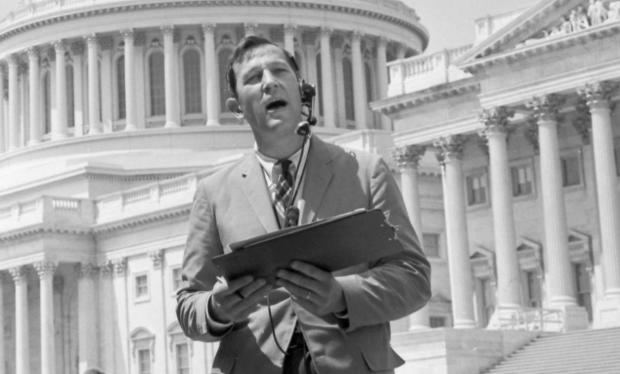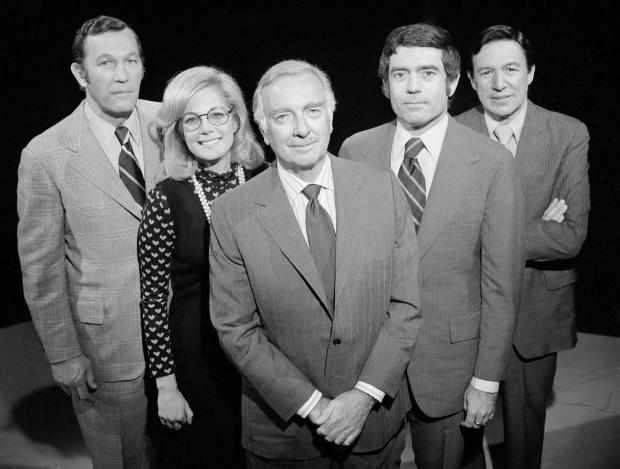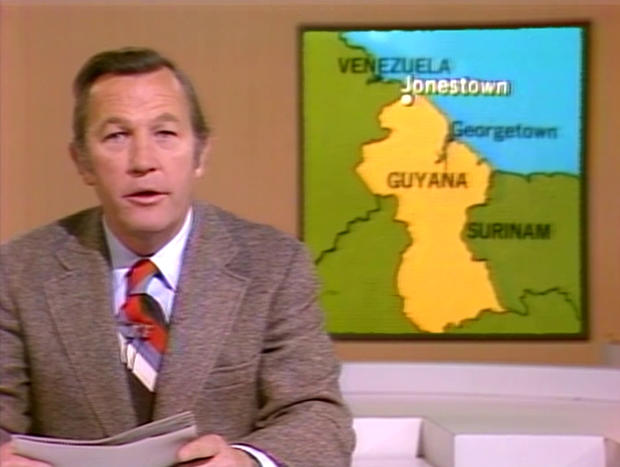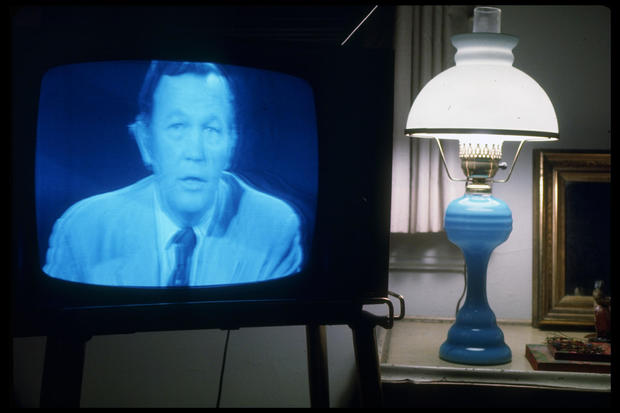
On November 4, 1979, he had perhaps his single biggest political interview and one of the most famous in presidential politics when he anchored and reported “CBS REPORTS: Teddy,” an hour-long look at Democratic presidential candidate Senator Edward M. Kennedy.
Mudd, with his concise interviewing style, homed in on a very basic question Kennedy was caught unprepared for: “Senator, why do you want to be president?” Kennedy rambled on awkwardly in a public moment of weakness that stopped his political momentum — he would go on to lose the Democratic nomination to Jimmy Carter.
In another singular moment with a Kennedy, Mudd was covering the 1968 presidential campaign of Senator Robert F. Kennedy, and was one of the last to interview him at the Ambassador Hotel in Los Angeles, minutes before Kennedy was murdered on June 5, 1968.
Mudd participated in other significant CBS REPORTS documentaries, none bigger than the Peabody award-winning “The Selling of the Pentagon,” a 1971 investigation that exposed the U.S. Military’s use of tax-payer financed public relations to burnish its image and sell the Vietnam War. The scathing report infuriated the military’s friends in Congress, which held hearings and subpoenaed the documentary’s un-broadcast footage.
That led to the televised appearance of CBS President Frank Stanton in front of Congress. He refused to produce the outtakes, likening them to print reporters’ sacrosanct notebooks. Stanton scored a significant victory for press freedom when the chamber voted not to hold him in contempt.

The Washington Bureau of CBS News in the 1960s and 1970s was full of big names. Seventy-five percent of the U.S. televisions in use were tuned to the three network newscasts each night, where tens of millions watched Eric Sevareid, Daniel Schorr, Marvin and Bernard Kalb, George Herman, Bob Schieffer, Lesley Stahl, Ed Bradley and Robert Pierpoint.
But none was bigger than Mudd. He had reported and co-anchored political conventions, elections and eventually earned his place as Walter Cronkite’s regular stand-in.

He cut his teeth on the stories of the early 1960s In the spring of 1964, Mudd broadcast reports for 67 days on the Senate’s debate over the Civil Rights Bill. In those days, reporters were paid a salary, plus fees for each time they appeared on air. He recounted later that his salary went from $400 a week to $2,500.
Mudd soon began fronting his own broadcasts. He anchored “The CBS Evening News with Roger Mudd” on Saturdays from February 1966 to July 1973 and on Sundays from January 1970 to September 1971. All the while, he continued to report on Congress and politics and became known as one of Cronkite’s “lead horsemen.”
Other big events he anchored or reported on included the triple Emmy-winning coverage of the resignation of Vice President Spiro Agnew; Emmy-winning coverage of the shooting of George Wallace; Memphis in the aftermath of the assassination of Dr. Martin Luther King, Jr.; and the resignation speech of President Richard Nixon. Mudd had co-anchored Nixon’s inaugural coverage with Cronkite in 1969.
Mudd also reported CBS News Specials, including, “Busing” and “The Issue of Busing” in the spring of 1972, and “New Voices in the South,” in 1971. He helped explain the workings of Congress to young people, anchoring “What’s Congress All About” in 1974 and “What’s the Senate All About?” in 1975.

In 1981, Mudd was considered the favorite to replace Cronkite. But Dan Rather, Mudd’s friend and rival, got the job. Mudd left for NBC News, where his old boss, former CBS News Washington Bureau chief and then-NBC News President Bill Small, teamed him with Tom Brokaw to co-anchor “NBC Nightly News.”
He left NBC in 1987 for the PBS broadcast “The MacNeil-Lehrer NewsHour,” where he served as political commentator and reporter. In 1992, he began teaching at Princeton and Washington and Lee Universities while taking a job with The History Channel, from which he retired in 2004 after 10 years as its principal on-air host.
In 2008, Mudd published his memoir, “The Place to Be: Washington, CBS and the Glory Days of Television News” (Public Affairs). In a publicity interview with the Huffington Post, he was quoted as saying, “I’m a CBS man, no matter how many times you heard me say, ‘Roger Mudd, NBC News.'”
Roger Harrison Mudd was born February 9, 1928, in Washington, D.C.. He received his undergraduate degree from Washington and Lee University in 1950 and his masters in American history from the University of North Carolina in 1951. He was pre-deceased by his wife of 54 years, Emma Jeanne Spears Mudd, with whom he had four children, all of whom survive him: Daniel, Maria Mudd-Ruth, Jonathan and Matthew. He is also survived by 14 grandchildren and two great-grandchildren.
